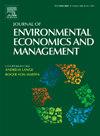Clean innovation, heterogeneous financing costs, and the optimal climate policy mix
IF 5.9
3区 经济学
Q1 BUSINESS
Journal of Environmental Economics and Management
Pub Date : 2024-11-01
DOI:10.1016/j.jeem.2024.103071
引用次数: 0
Abstract
Access to finance is a major barrier to clean innovation. We incorporate a financial sector in a directed technological change model, where research firms working on different technologies raise funding from financial intermediaries at potentially different costs. We show that, in addition to a rising carbon tax and a generous but short-lived clean research subsidy, optimal climate policies include a clean finance subsidy directly aimed at reducing the financing cost differential across technologies. The presence of an endogenous financing experience effect induces stronger mitigation efforts in the short-term to accelerate the convergence of heterogeneous financing costs. This is achieved primarily through a carbon price premium of 39% in 2025, relative to a case with no financing costs.
清洁创新、异质融资成本和最佳气候政策组合
获得资金是清洁创新的一大障碍。我们在定向技术变革模型中加入了金融部门,研究不同技术的研究公司以潜在的不同成本从金融中介机构筹集资金。我们的研究表明,除了不断提高的碳税和慷慨但短期的清洁研究补贴外,最佳气候政策还包括直接旨在减少不同技术间融资成本差异的清洁融资补贴。内生融资经验效应的存在会在短期内加大减排力度,以加速不同融资成本的趋同。这主要是通过 2025 年相对于无融资成本情况下 39% 的碳价格溢价来实现的。
本文章由计算机程序翻译,如有差异,请以英文原文为准。
求助全文
约1分钟内获得全文
求助全文
来源期刊
CiteScore
8.00
自引率
4.30%
发文量
91
期刊介绍:
The Journal of Environmental Economics and Management publishes theoretical and empirical papers devoted to specific natural resources and environmental issues. For consideration, papers should (1) contain a substantial element embodying the linkage between economic systems and environmental and natural resources systems or (2) be of substantial importance in understanding the management and/or social control of the economy in its relations with the natural environment. Although the general orientation of the journal is toward economics, interdisciplinary papers by researchers in other fields of interest to resource and environmental economists will be welcomed.

 求助内容:
求助内容: 应助结果提醒方式:
应助结果提醒方式:


